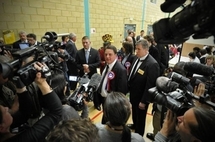Far-right British party licks wounds after poll wipe-out
Alice Ritchie
BARKING, Alice Ritchie- As the dust settles after Britain's election, the far-right British National Party is reassessing its strategy after its much-hoped for success turned into a spectacular defeat.
After winning its first two seats in the European Parliament last year, the BNP had promised to create a "political earthquake" in the May 6 elections by winning its first member of parliament (MP) in Barking, east of London.

BNP leader Nick Griffin speaks to the media.
"You're not wanted here and your vile politics have no place in British democracy. Pack your bags and go," a defiant Hodge said in her victory speech.
Their poor showing was a surprise and goes against a European trend -- the far-right entered parliament for the first time in Hungary this year, holds power in Slovakia and Italy and contested presidential elections in Austria.
But experts warn it is too soon to write them off, as the party won half a million votes nationwide, a tripling of its support since the 2005 election.
"It certainly wouldn't be wise to be complacent about the BNP's demise," said Dr. Robert Ford of the University of Manchester.
One reason for this is that the key concerns that drove the party's support show no signs of going away, in particular immigration, which the BNP has promised to halt and reverse with a voluntary repatriation scheme.
National politicians avoid the issue -- but Hodge has tried to tackle it ever since the BNP won its 12 council seats in 2006, as well as a perception among many working-class Britons that the Labour party has abandoned them.
While she can do little about the influx of migrants, she assured voters she would address the perceived unfairness in the way they use public services, in particular social housing, and sought to listen to their other concerns.
"Was I certain we would win? No," she told AFP -- but hundreds of hours of campaigning, with the help of anti-fascist groups, ensured she took 54 percent of the vote compared to Griffin's 15 percent.
The message she sent to her Labour party -- currently embroiled in a leadership election after Gordon Brown stepped down -- was that they had to engage with the BNP. "You can't beat them by ignoring them," she said.
In a radio interview shortly after polling day, Griffin admitted the party "took the most terrible battering" in Barking but blamed in part the "very high expectations" after the EU elections last year.
The BNP campaign was damaged by the arrest of its publicity chief on suspicion of threatening to kill Griffin, and the taking down of the website by a disgruntled party member just two days before polling day.
But Griffin also said Labour had put together a "fantastic" operation and said the BNP's trouncing must be taken as a "wake-up call".
The party has a serious image problem, however. Despite Griffin's modernising efforts over the past decade, the media and many voters still see it as racist and Ford warned this could prevent them ever winning power.
"It's not that there isn't a potential support for the kind of politics that the BNP represent, it just looks increasingly unlikely that the BNP will be the party that successfully mobilises that potential," he said.
This view is reflected on the streets of Barking, where Rashid Aleem, 41, pointed to Griffin's appearance on a prime-time TV debate last year as the moment when it became clear what the party stood for.
Although he cites immigration as a concern, he told AFP: "People saw that and realised he's using the influx of eastern European immigrants as a front for his real agenda, which is racist."
Unemployed construction worker Guy Kerr, 47, admits he is the kind of person the BNP courts and backs their policies on more jobs for indigenous British workers and to pull troops out of Afghanistan.
"But they're racist," he said, adding: "I honestly thought they would get in here and I'm glad they didn't."
-----------------------------------------------------------------------